Raising a child with autism affects the whole family in both positive and challenging ways. But so much of your attention as a parent goes to caring for your child with autism, and understandably so. In turn, siblings may struggle with very legitimate challenges that come from having a brother or sister on the spectrum. How do you build relationships with and attend to all your children while still meeting the needs of your child on the spectrum? With some planning and intentional communication, you can manage time spent with each child.
Sibling Stress
According to a 2023 study, siblings of children with autism tend to face more social and emotional struggles than those with non-autistic siblings. Some challenges typically developing siblings may face include:
- Embarrassment around friends or the public when a sibling with autism displays certain behaviors.
- Jealousy for attention from parents who are often helping the child on the spectrum.
- Experiencing aggressive behaviors from sibling with autism.
- Anxiety from lack of information or understanding about a sibling’s disability, as well as responsibility for their sibling.
- Wanting to make up for the sibling with autism’s shortcomings to ease their parent’s mind.
It’s easy for parents of a child with autism to feel discouraged and maybe even guilty upon learning the difficulties their other children face. While you are doing the very best you can, there are ways to balance your time and attention for all your children.
Supporting Siblings of Children With Autism
Tune In
Recognizing the challenges your non-autistic child may face in regard to their sibling on the spectrum is crucial to their sense of safety and care. Notice how they may react to difficult moments with their sibling on the spectrum or how they respond to you or your partner when around their sibling. Additionally, familiarize yourself with “glass child syndrome.” Awareness of behaviors and emotions can open up problem-solving possibilities that you may have thought were insurmountable.
Communicate
Talk about autism openly and accurately so your kids understand their sibling. As mentioned earlier, siblings of children with autism can feel anxious if not kept in the loop about everything that’s happening with their brother or sister. Start conversations with your children and let them know it’s ok to ask questions or experience difficult feelings. For example, debrief with your child after their sibling displays disruptive behaviors. Listen to how they’re feeling and empathize with them, acknowledging the hard moment and how it affected you both. Additionally, keep communication ongoing. Your life with a child with autism is a huge part of your family dynamics, so involve all members in honest communication that is appropriate to their age level.
Plan
Since so much time is dedicated, by nature, to your child with autism, it is all the more important to dedicate time to their sibling and do so consistently. One great way to maintain consistency is planning special, uninterrupted one-on-one time with your child, doing something that aligns with their interests. Perhaps this looks like a short nightly bedtime activity, game or getting a treat each weekend. Intentionally setting aside time will help your child(ren) feel seen and understood. You can even trade off with your spouse or partner if circumstances allow.
Set Boundaries
You may utilize your child with autism’s siblings to care for them from time to time. Avoid overburdening your child(ren) with too many responsibilities with their sibling. Acknowledge that your child needs their space regularly, just as you need space occasionally, as well. Setting boundaries together is helpful, such as asking your child when they feel overwhelmed in caring for their sibling and coming up with a plan on how to communicate that.
Additionally, prioritize safe spaces. Siblings are often targets for aggressive behavior from a brother or sister on the spectrum. Help your child learn how to respond when such behaviors occur, as well as storing valuable belongings in a place inaccessible to their sibling. Uphold the importance of respecting your non-autistic kids’ space and personal items.
Involve Siblings in ABA Therapy
A great idea that one of our BCBAs, Megan, has is to ask your child’s ABA provider if their siblings could attend some sessions. Doing this can help empower them with perspective, knowledge and tools, which can foster closer relationships with their sibling.
Foster Individuality
Encourage your child to explore activities that pique their interest, as this will help boost their confidence and help make them feel special and valuable outside of being a sibling to a child with autism. Expressing support when exploring your child’s interest with them can be another great way to spend one-on-one time with them.
Utilize Outside Support
It can be incredibly beneficial and validating for siblings of children with autism to be around others who can relate. Support groups such as the Sibling Support Project connect children who have siblings with special needs, allowing a space for kids to process the ups and downs of living with their sibling. Likewise, encourage your child(ren) to seek out and befriend peers who have a sibling with autism at school or in any other extracurricular settings. Just like adults, when kids have friends who understand them, they will experience less isolation and more allyship.
Benefits of Having a Sibling on the Spectrum
Let’s not forget that challenges make us learn and become better people. Despite adversities siblings face, there is a plethora of good things that come from being a sibling of a child with autism. Siblings of children with special needs are more likely to go into helping professions such as teaching, special education, and medical professions. Some of our own Healing Haven staff have family members with a disability, and a few of our families have children who have gone on to thrive in such careers.
Likewise, these siblings grow up utilizing skills such as compassion, empathy, and patience. They learn to advocate not only for their brother or sister, but for other individuals with special needs they may encounter. Those with a brother or sister on the spectrum can see the world from different perspectives just as their siblings do. Finally, the daily challenges that non-autistic siblings face can mold them into a person of maturity, leadership, and courage.
Keep in mind that how you respond to your child’s disability will be how your other child(ren) responds. Set a clear example of positivity for your family so your kids will see less hindrances and more joy. Amidst all the challenges, siblings of kids with autism are rockstars in life!
More Resources
- Our ABA Parent Training provides ideas for supporting typical children in how they interact with their sibling. Additionally, we provide counseling for siblings so they have a safe place to talk through their experiences and help them navigate their often complex world.
- Check out this book on siblings and autism: Siblings of Children With Autism: A Guide For Families

